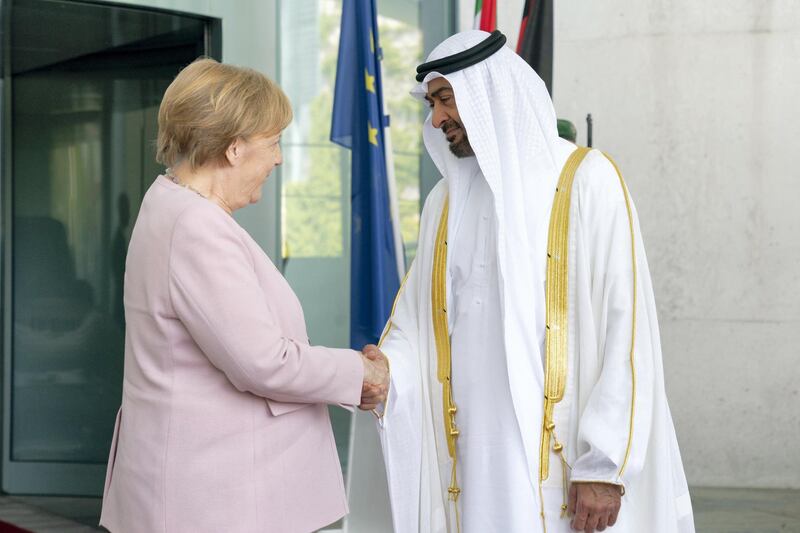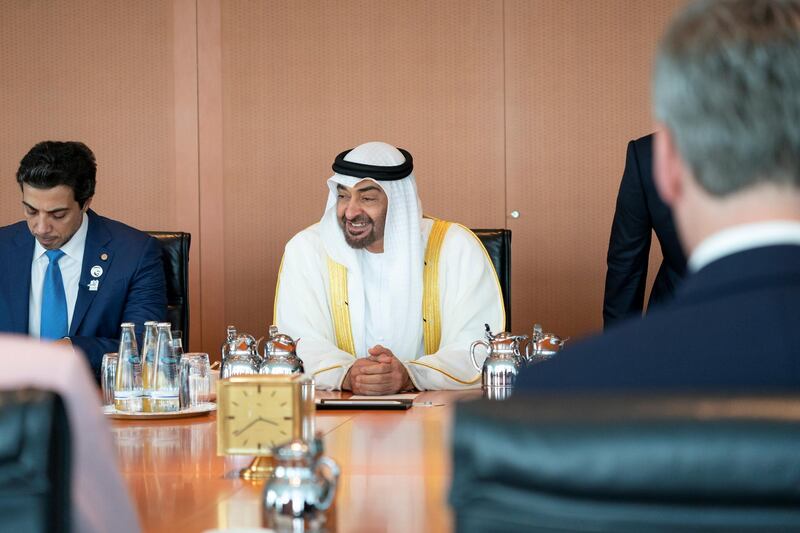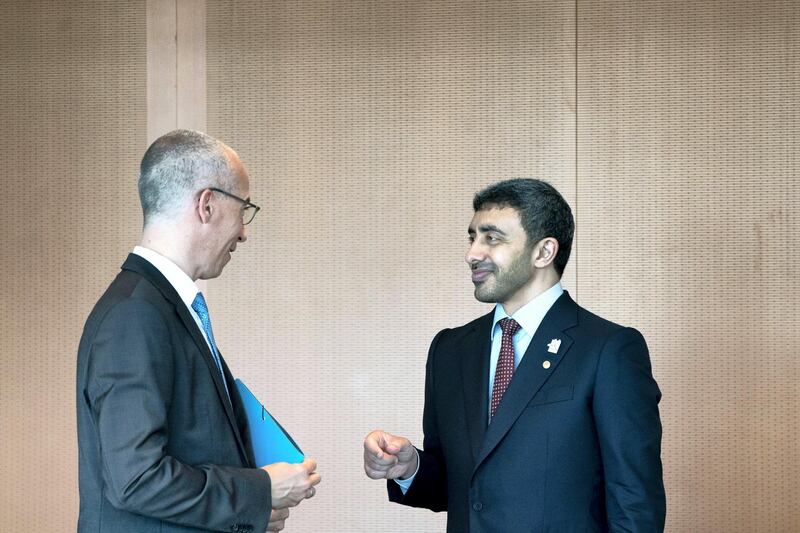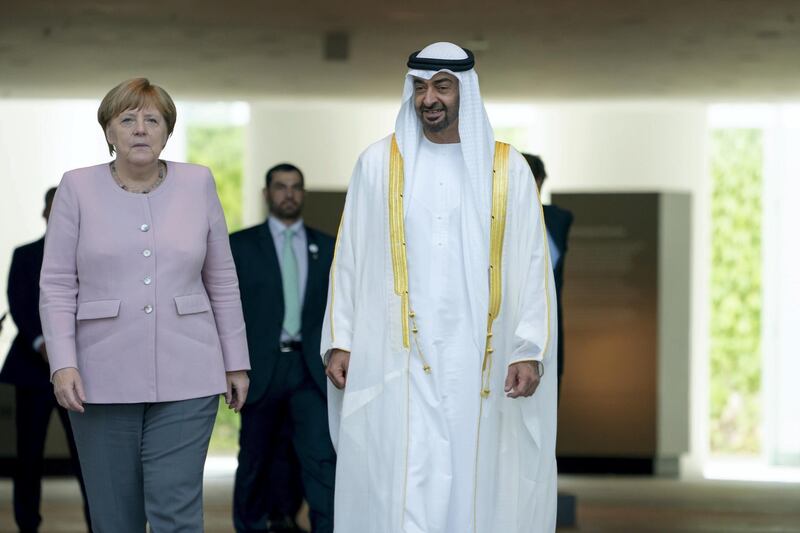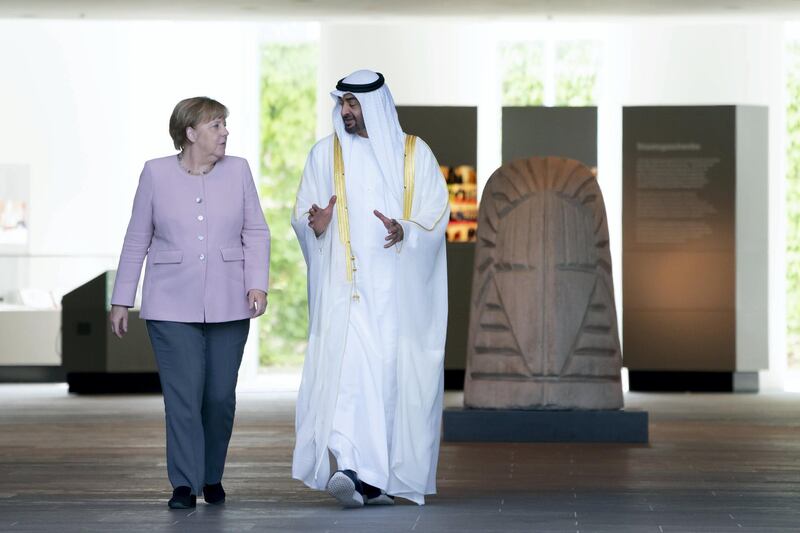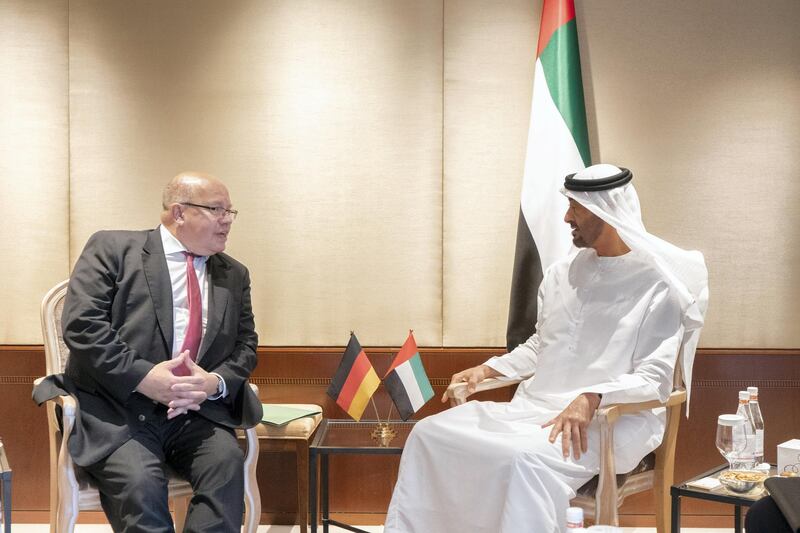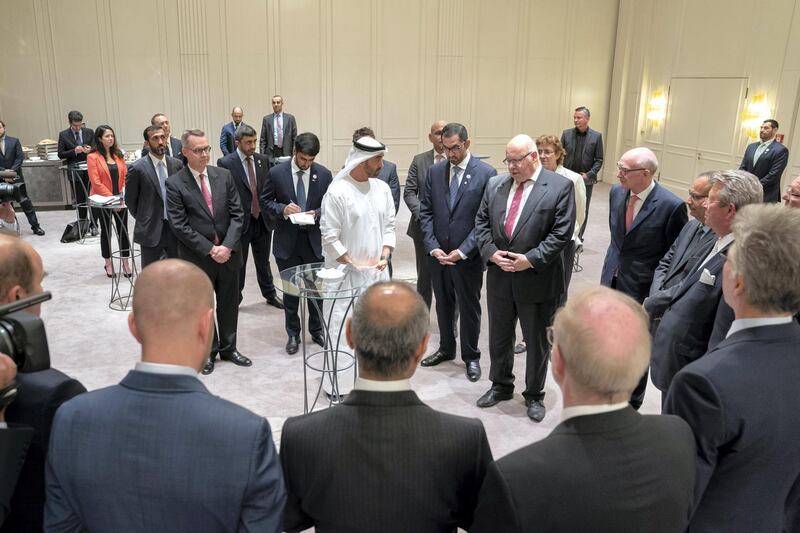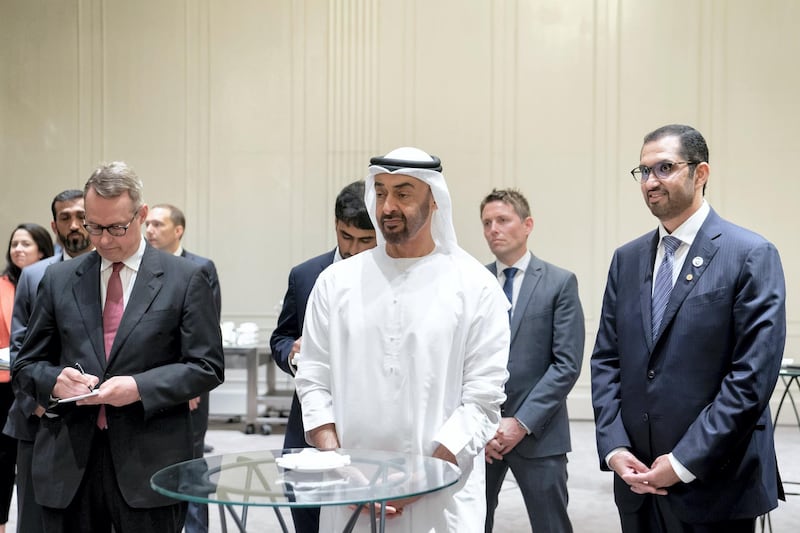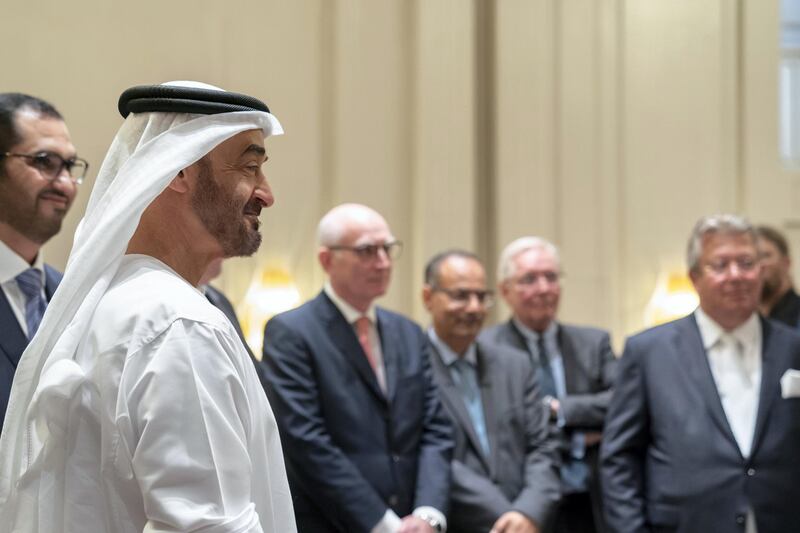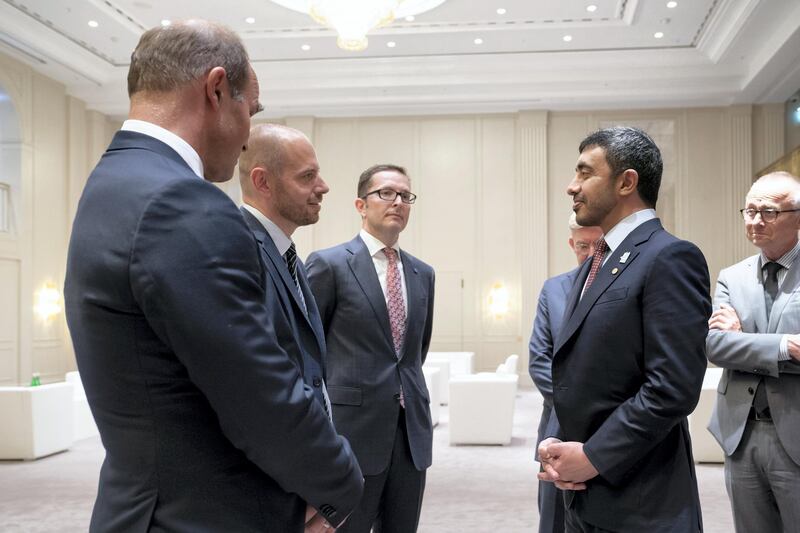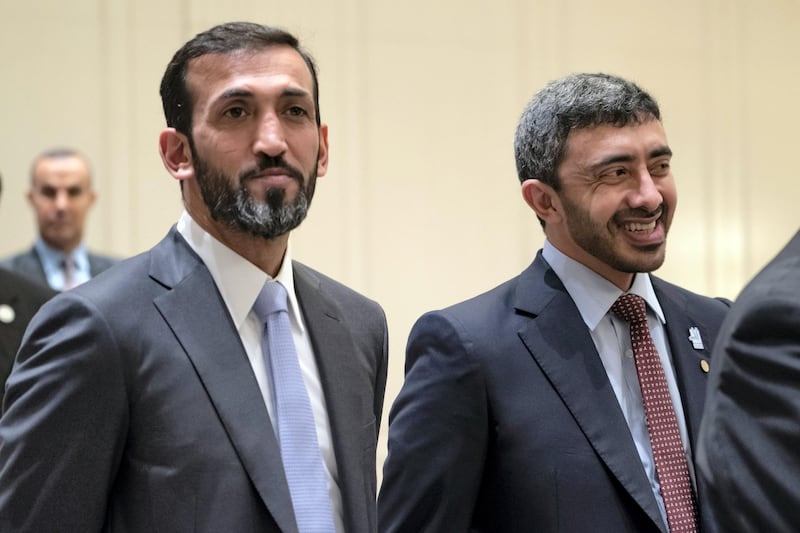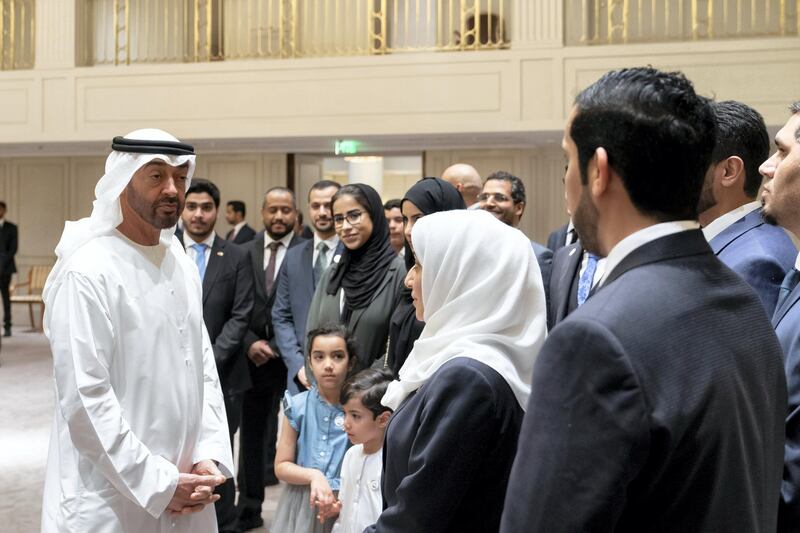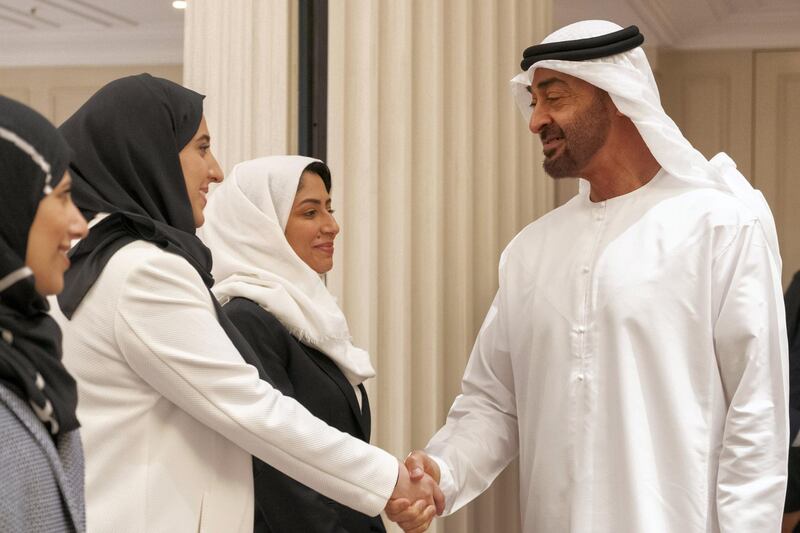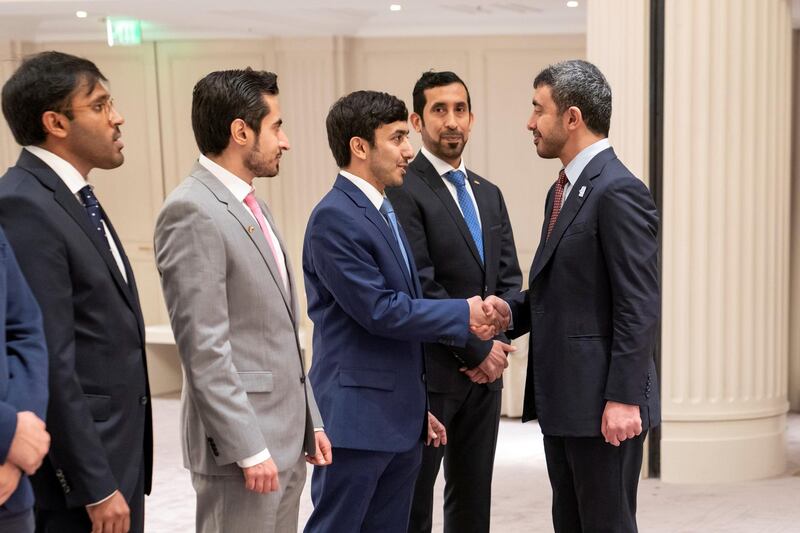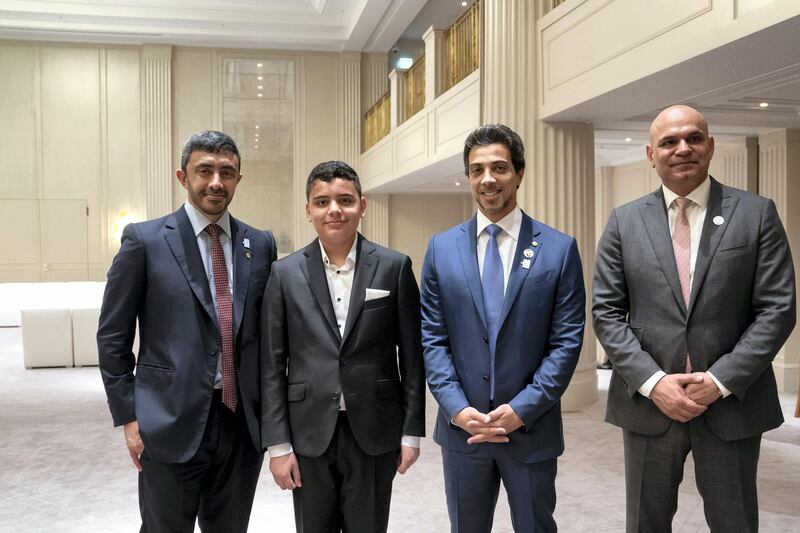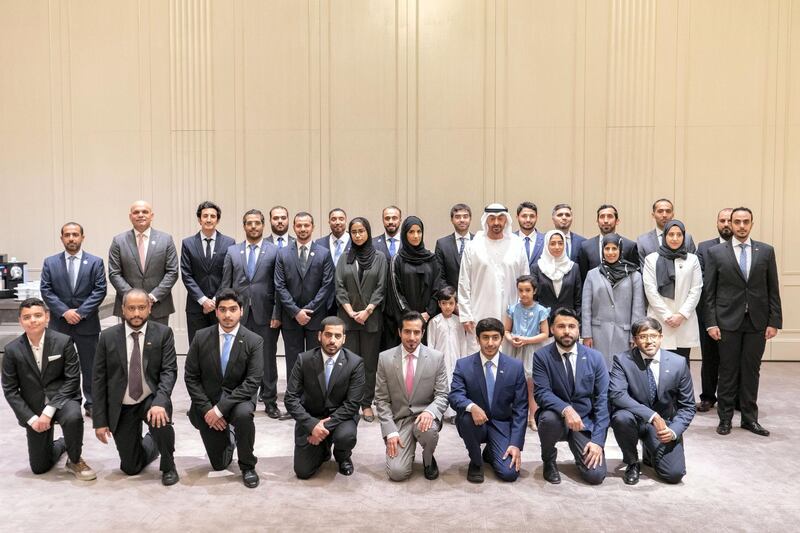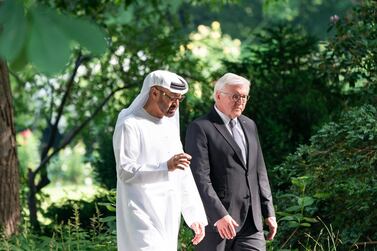A two-day visit to Germany by Sheikh Mohamed bin Zayed has included a friendly exchange of views with Angela Merkel, the German Chancellor, and meetings at ministerial level between the UAE delegation and their hosts.
After arriving in Berlin, the Crown Prince of Abu Dhabi and Deputy Supreme Commander of the Armed Forces met President Frank-Walter Steinmeier at Bellevue Palace, the official presidential residence, then Mrs Merkel on Wednesday.
Their talks continued over a dinner hosted by Mrs Merkel in Sheikh Mohamed's honour, where the leaders agreed that recently appointed special envoys would pursue deeper ties.
''I am extremely happy to be here in Germany as we are celebrating the 15th anniversary of signing our Strategic Partnership Agreement," Sheikh Mohamed said, according to the state news agency Wam.
"The trade exchange at that time was $3 billion and now it is close to $14bn. Our visit to Germany confirms that we have a new roadmap for another 15 years.
"We are looking forward to double our trade exchange. We have discussed a variety of issues and we agree on many of them. We hope to see our bilateral relations and co-operation getting stronger."
Mrs Merkel warmly welcomed the visit of the Abu Dhabi Crown Prince to Berlin, after his last trip in 2016 and her visit to the UAE in 2017.
She said her talks with Sheikh Mohamed tackled a wide range of bilateral issues, most notably the celebration of the 15-year strategic partnership between the two countries.
''Our talks today underscore our commitment to deepen our bilateral ties, a goal which clearly accentuated by the Joint Statement issued on Wednesday on 'Advancing towards a more Comprehensive Strategic Partnership between the United Arab Emirates and the Federal Republic of Germany'."
The two leaders also released a joint statement.
"Both sides identified the importance of holding political consultations regularly," the statement said.
"Both sides emphasised the importance of holding these political consultations on a senior level and to increase the frequency of these consultations."
I was delighted to meet the German Chancellor Angela Merkel today. We share longstanding historic ties and a solid strategic partnership. Our two nations are anchors of peace and stability, supporting global peace efforts and rejecting terrorism and extremism. pic.twitter.com/rMOFX8oAcp
— محمد بن زايد (@MohamedBinZayed) June 12, 2019
The German leader has cultivated close ties with the UAE during her 14 years in power in Berlin, particularly in economic co-operation, where the two states enjoy complementary strengths.
The UAE is Germany’s largest Arab trading partner.
The two countries are celebrating the 15th anniversary of their signing of the strategic partnership agreement, designed as a platform for pressing international issues.
A statement issued during the talks said the two countries unequivocally rejected terrorism and violent extremism.
"The two sides agree on rallying efforts on counter-terrorism issues, exchanging of expertise and information on combating terrorism, and strengthening individual training and capacity-building in that regard," the joint communique said.
"To that end, both sides seek to engage in tangible counter-terrorism co-operation."
The UAE delegation raised concerns over Iran’s ballistic missiles and rising regional tension.
German officials said, reassurances were given that the EU sanctions targeting Iran’s role in developing and distributing the weapons were an effective response to the threat posed by Tehran, and were kept under review.
Mrs Merkel voiced her concern over the Iran's missile programme and Tehran's interference in Syria, Wam reported.
On Iran's nuclear deal, she acknowledged the divergent views but said: ''We are in favour of political, peaceful solutions.''
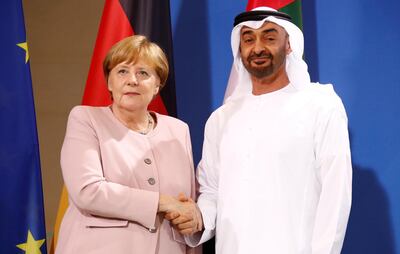
Talks on Yemen focused on a consensus over supporting the role of the UN and the importance of the Gulf initiative.
In particular both sides were agreed on the need to support the Stockholm Agreement, UN envoy Martin Griffiths and his drive to bring the negotiations to the next stage.
"The UAE and Germany strongly encourage a political solution," the statement said.
"Both sides also express their unequivocal support for the ongoing efforts of Martin Griffiths, special envoy of the UN Secretary General to Yemen."
Sheikh Mohamed used the trip to predict that relations would grow stronger over time.
“Two friendly nations that share hopes and aspirations for global peace and security, both instrumental in securing sustained development and prosperity,” he wrote in the Bellevue Palace visitors' book.
A close partnership exists in counter-terrorism and tackling extremism has been nurtured by the two states. The two countries also enjoy energy co-operation and alliances in delivery of humanitarian aid.
Sheikh Mohamed also met Germany Foreign Minister Heiko Maas for a discussion on regional developments, in a meeting attended by Sheikh Abdullah bin Zayed, Minister of Foreign Affairs and International Co-operation.
Mohamed bin Zayed meets Germany’s Foreign Minister in Berlin to discuss bilateral relations and the latest developments in the Middle East. pic.twitter.com/vSaT2tdzui
— محمد بن زايد (@MohamedBinZayed) June 12, 2019
Ernst Peter Fischer, Germany's ambassador to the UAE, said the tour by Sheikh Mohamed would aid joint efforts to promote tolerance and counter extremism.
Mr Fischer said the two nations had much in common and an opportunity to build on already strong links.
During his stay in Germany, Sheikh Mohamed has covered subjects from politics, peace, battling radical ideology and promises to usher in new avenues for growth in artificial intelligence, energy and the environment.
“Federal Chancellor Angela Merkel and Sheikh Mohamed bin Zayed will take this opportunity to outline how we will deepen our partnership in the political, economic and cultural fields, including tolerance and the prevention of extremism,” Mr Fischer said.
“Germany and the United Arab Emirates have been closely connected since the foundation of the UAE. Sheikh Zayed [the UAE's Founding Father] was a friend of Germany and visited several times.
“Both countries share a strong focus on future trends and have high ambitions.
“We plan to co-operate especially on intelligent manufacturing, the Internet of Things, artificial intelligence, as well as resource efficiency in energy, water and food and the green economy.”
In a short comment article, Bild, Germany's best-selling newspaper, noted that Mrs Merkel had shown repeated appreciation for Sheikh Mohamed's "wisdom" and "personal interpretation" of events in phone calls and personal meetings throughout her time in office.
Mrs Merkel is due to retire at the next German election in 2021.
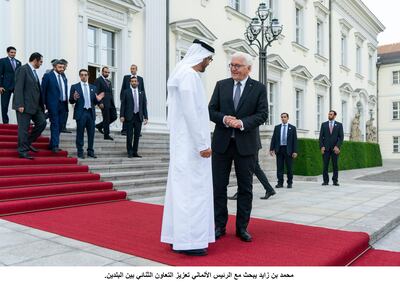
Also during the trip, Sheikh Mohamed met UAE students living in Germany.
“I was proud to meet some of our most talented students today as part of my visit to Germany. They are a true reflection of the UAE’s efforts to foster a sustainable knowledge economy,” Sheikh Mohamed declared in a tweet.
“I met our scholarship holders in Berlin. They are our pride and represent the UAE. They embody our ambition to bring in a competent and educated generation that contributes to the national upswing.
"We have great confidence in the success of Zayed's children.”
